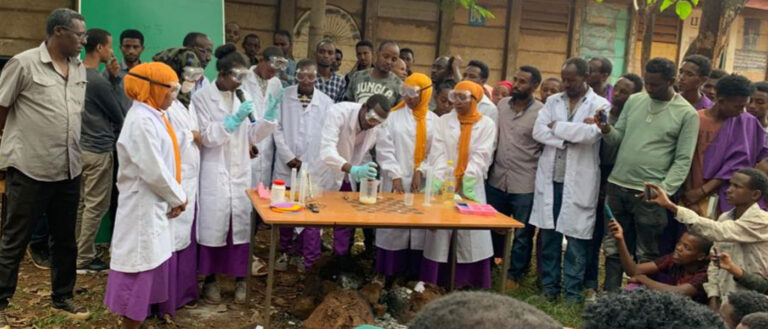Zemene Tegegn, a master’s student in chemical engineering, traveled back to his roots this summer to work with students at the high school he attended in his home village of Delo Mena, Ethiopia. As a Gelfand Global Fellow participating in the Gelfand Global STEMpower Initiative, Tegegn is helping develop engineering labs that connect basic scientific principles to entrepreneurship and economic development.
During this summer’s project, Tegegn taught students how to use engineering to convert natural resources into higher value products such as soap, which uses oil pressed from seeds of plants that grow right in the village.
Throughout the three-day program, students learned the physics behind extracting oil from seeds, the chemistry behind making soap from the oil—balancing chemical reactions, temperature changes and more—and the engineering design considerations to make it all work effectively.
Once the soap was made, the students participated in a friendly competition. Tapping into their entrepreneurial skills, they used local plants and flowers to give the soap scents and colors and packaged them in a way that would appeal to customers. Finally, each student presented their product to the judges, and in front of an audience of 600 students and members of the community, the winners were announced.

Before this hands-on experience, most students were not familiar with science or engineering, Tegegn explained. Throughout the program, students started to develop a deep interest in the project and were inspired to pursue science and engineering further, which Tegegn shared was the most rewarding part.
“This is really the essence of chemical engineering,” Dan Lacks, associate dean of academics and the C. Benson Branch Professor in the Department of Chemical and Biomolecular Engineering, said. “Using scientific principles, engineering design and creativity to make products that benefit society.”
The Gelfand Global STEMpower Initiative is funded by Mark Gelfand, who was awarded an honorary doctorate degree from Case Western Reserve University at the 2022 commencement ceremony. Through the initiative students in sub-Saharan Africa get the opportunity to do hands-on science labs, which because of the resource limitations, is rare. Time in the labs working on projects like the one led by Tegegn educates and excites students about opportunities in the STEM fields.

